小学英语一般现在时态解析卷
小学语法专题解析:现一般现在时常考题
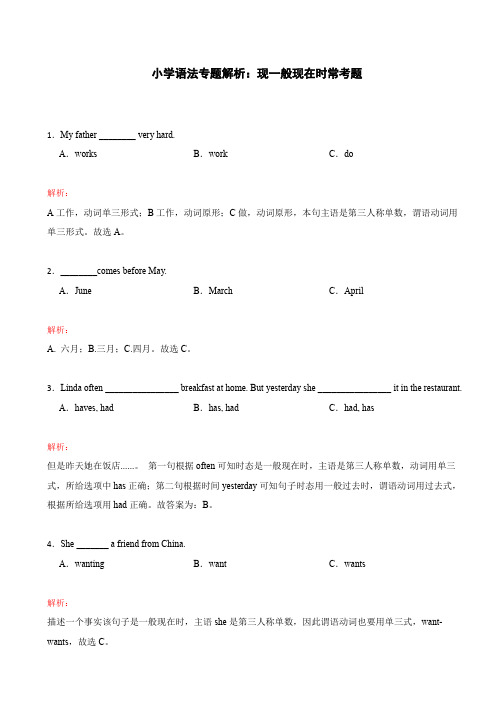
小学语法专题解析:现一般现在时常考题1.My father ________ very hard.A.works B.work C.do解析:A工作,动词单三形式;B工作,动词原形;C做,动词原形,本句主语是第三人称单数,谓语动词用单三形式。
故选A。
2.________comes before May.A.June B.March C.April解析:A. 六月;B.三月;C.四月。
故选C。
3.Linda often ________________ breakfast at home. But yesterday she ________________ it in the restaurant.A.haves, had B.has, had C.had, has解析:但是昨天她在饭店......。
第一句根据often可知时态是一般现在时,主语是第三人称单数,动词用单三式,所给选项中has正确;第二句根据时间yesterday可知句子时态用一般过去时,谓语动词用过去式,根据所给选项用had正确。
故答案为:B。
4.She _______ a friend from China.A.wanting B.want C.wants解析:描述一个事实该句子是一般现在时,主语she是第三人称单数,因此谓语动词也要用单三式,want-5.January 1st is _________ New Year's Day.A.called B.call C.calling解析:be called被叫作,故选A。
6.The paper crane (纸鹤) _____________her best wishes to her friend.A.show B.shows C.to show解析:该句子是一般现在时,主语paper crane是第三人称单数,因此谓语动词也要用第三人称单数形式,故选B。
7.She comes ________ the library.A.on B.to C.with解析:A. 在--上;B.朝向;C.和/伴随。
五年级英语一般现在时试题答案及解析
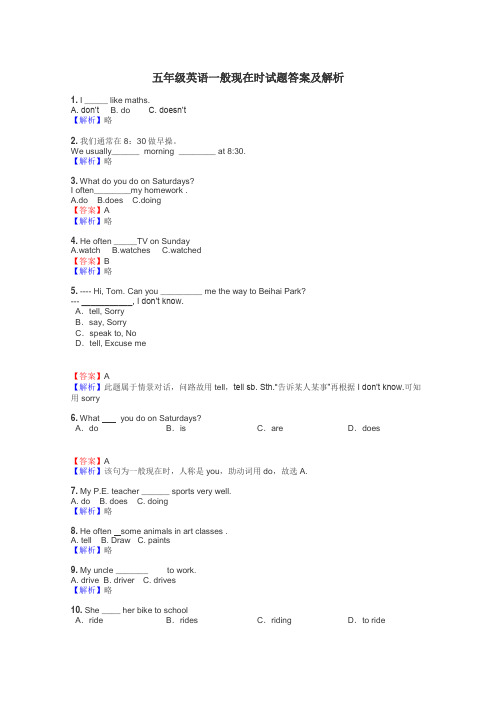
五年级英语一般现在时试题答案及解析1. I _____ like maths.A. don’tB. doC. doesn’t【解析】略2.我们通常在8:30做早操。
We usually______ morning ________ at 8:30.【解析】略3. What do you do on Saturdays?I often________my homework .A.doB.doesC.doing【答案】A【解析】略4. He often _____TV on SundayA.watchB.watchesC.watched【答案】B【解析】略5. ---- Hi, Tom. Can you _________ me the way to Beihai Park?--- ___________, I don’t know.A.tell, SorryB.say, SorryC.speak to, NoD.tell, Excuse me【答案】A【解析】此题属于情景对话,问路故用tell,tell sb. Sth.“告诉某人某事”再根据I don’t know.可知用sorry6. What you do on Saturdays?A.do B.is C.are D.does【答案】A【解析】该句为一般现在时,人称是you,助动词用do,故选A.7. My P.E. teacher ______ sports very well.A. doB. doesC. doing【解析】略8. He often some animals in art classes .A. tellB. DrawC. paints【解析】略9. My uncle _______ to work.A. driveB. driverC. drives【解析】略10. She ____ her bike to schoolA.ride B.rides C.riding D.to ride【解析】略11. He reading and writing .A. likesB. doesC. like【解析】略12. She ____ her bike to schoolA.ride B.rides C.riding D.to ride【解析】略13. She ____ a stamp for his letterA. needB. needsC. to need.【解析】略14. We often _________ sports in the afternoon.A. playB.playingC.are playing【解析】略15. _____ I speak to your grandpa?A. DoB. CanC. Am【解析】略16. -----Do you ________Chinese?------No, I _______.A. live; don'tB. from don'tC. speak; don't【答案】A【解析】Chinese 中国的/中国人/汉语,此处只能取名词汉语的意思。
小学英语一般现在时时态结构全面解析
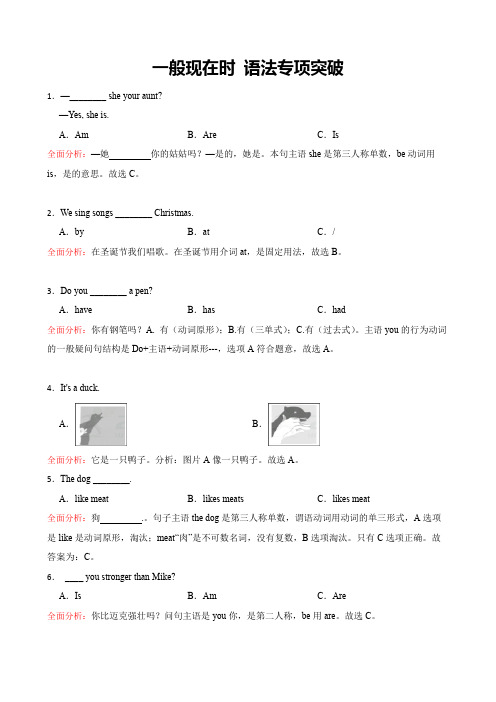
一般现在时语法专项突破1.—________ she your aunt?—Yes, she is.A.Am B.Are C.Is全面分析:—她你的姑姑吗?—是的,她是。
本句主语she是第三人称单数,be动词用is,是的意思。
故选C。
2.We sing songs ________ Christmas.A.by B.at C./全面分析:在圣诞节我们唱歌。
在圣诞节用介词at,是固定用法,故选B。
3.Do you ________ a pen?A.have B.has C.had全面分析:你有钢笔吗?A. 有(动词原形);B.有(三单式);C.有(过去式)。
主语you的行为动词的一般疑问句结构是Do+主语+动词原形---,选项A符合题意,故选A。
4.It's a duck.A.B.全面分析:它是一只鸭子。
分析:图片A像一只鸭子。
故选A。
5.The dog ________.A.like meat B.likes meats C.likes meat全面分析:狗.。
句子主语the dog是第三人称单数,谓语动词用动词的单三形式,A选项是like是动词原形,淘汰;meat“肉”是不可数名词,没有复数,B选项淘汰。
只有C选项正确。
故答案为:C。
6.____ you stronger than Mike?A.Is B.Am C.Are全面分析:你比迈克强壮吗?问句主语是you你,是第二人称,be用are。
故选C。
7.We _______ toast and jam; he _______ bread.A.like; like B.like; likes C.likes; like全面分析:我们喜欢烤面包和果酱,他喜欢面包。
描述一个事实,该句子是一般现在时,前半句主语we是第一人称复数,因此谓语动词要用动词原形like,后半句主语he是第三人称单数,因此谓语动词也要用单三式likes,故选B。
8.They _______ young then. But now they _______ old.A.was; is B.were; are C.are; were全面分析:那时他们.年轻。
六年级英语时态练习题50题含答案解析

六年级英语时态练习题50题含答案解析1.She _____ to school by bus every day.A.goB.goesC.goingD.went答案解析:B。
选项A 形式错误,主语是she,动词要用第三人称单数形式goes;选项C going 不能单独作谓语;选项D went 是过去式,而题干中every day 表明是一般现在时。
一般现在时中,当主语是第三人称单数时,动词要用第三人称单数形式。
2.We _____ our homework after school.A.doB.doesC.doingD.did答案解析:A。
选项B does 是第三人称单数形式,we 不是第三人称单数;选项C doing 不能单独作谓语;选项D did 是过去式,题干是一般现在时。
一般现在时中,we 作主语,动词用原形。
3.My father _____ to work by car.A.goB.goesC.goingD.went答案解析:B。
选项A 形式错误,主语my father 是第三人称单数,动词要用goes;选项C going 不能单独作谓语;选项D went 是过去式,题干是一般现在时。
一般现在时中,第三人称单数作主语,动词用第三人称单数形式。
4.They _____ football on weekends.A.playB.playsC.playingD.played答案解析:A。
选项B plays 是第三人称单数形式,they 不是第三人称单数;选项C playing 不能单独作谓语;选项D played 是过去式,题干是一般现在时。
一般现在时中,they 作主语,动词用原形。
5.I _____ books in my free time.A.readB.readsC.readingD.readed答案解析:A。
选项B reads 是第三人称单数形式,I 不是第三人称单数;选项C reading 不能单独作谓语;选项D readed 形式错误,read 的过去式和过去分词都是read。
英语一般现在时题20套(带答案)含解析
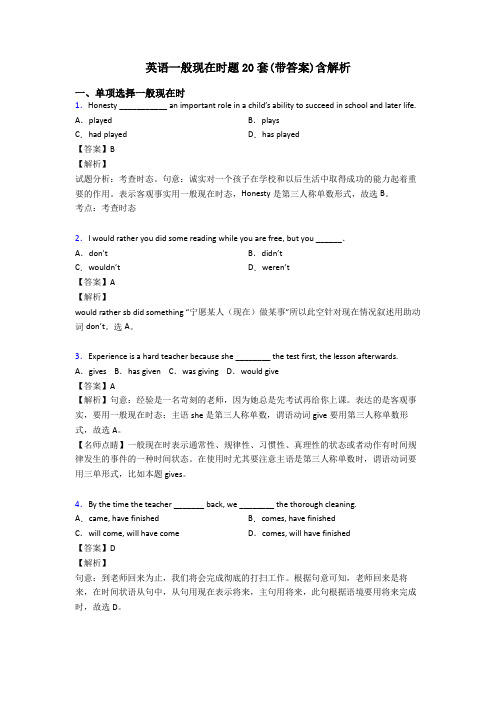
英语中有些动词在形式上是主动的,含义上却是被动的,但是这些动词这样用时又不是不及物动词。常见的这类动词有:sell, wash, cook, wear, rite, look, open, shut, translate, read, last, cut等。
—Would you like a piece of this kind of cloth?
英语一般现在时题20套(带答案)含解析
一、单项选择一般现在时
1.Honesty ___________ an important role in a child’s ability to succeed in school and later life.
A.playedB.plays
C.had playedD.has played
A.finding; reflectingB.found; reflected
C.found; to reflectD.found; reflect
【答案】D
【解析】
考察非谓语动词。过去分词做定语表示被动的,发生过的动作。句意:在空气中许多被发现的气体实际上反映了从地球表面扩散又回到地球的热能。前文动词为gases的定语,发生过的用过去分词,下文从此为句子谓语。叙述一个客观存在的事实,用一般现在时态,gases为复数,故动词用原形,选D。
说明这种纸易撕烂,是主语的性质。本题即考查这种笔所具备的特点,故用现在时的主动语态。A为一般现在时的被动语态,B为现在进行时,C一般过去时。
考点:考查时态语态的用法。
7.He’s been informed that he ________ for the scholarship because of his academic background.
六年级英语一般现在时练习题50题答案解析版
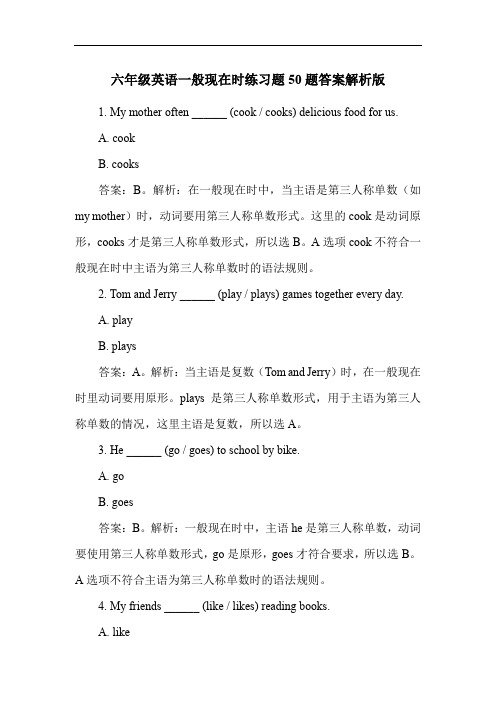
六年级英语一般现在时练习题50题答案解析版1. My mother often ______ (cook / cooks) delicious food for us.A. cookB. cooks答案:B。
解析:在一般现在时中,当主语是第三人称单数(如my mother)时,动词要用第三人称单数形式。
这里的cook是动词原形,cooks才是第三人称单数形式,所以选B。
A选项cook不符合一般现在时中主语为第三人称单数时的语法规则。
2. Tom and Jerry ______ (play / plays) games together every day.A. playB. plays答案:A。
解析:当主语是复数((Tom and Jerry)时,在一般现在时里动词要用原形。
plays是第三人称单数形式,用于主语为第三人称单数的情况,这里主语是复数,所以选A。
3. He ______ (go / goes) to school by bike.A. goB. goes答案:B。
解析:一般现在时中,主语he是第三人称单数,动词要使用第三人称单数形式,go是原形,goes才符合要求,所以选B。
A选项不符合主语为第三人称单数时的语法规则。
4. My friends ______ (like / likes) reading books.A. like答案:A。
解析:因为主语my friends是复数,在一般现在时里,复数主语后的动词用原形。
likes是第三人称单数形式,用于单数主语,所以选A。
5. She ______ (watch / watches) TV in the evening.A. watchB. watches答案:B。
解析:一般现在时中,主语she是第三人称单数,动词要用第三人称单数形式,watch是原形,watches符合,所以选B。
A选项不符合语法规则。
6. We ______ (have / has) English lessons on Monday.A. haveB. has答案:A。
小学英语语法时态归纳及练习(含答案解析)

英语时态归纳一、一般现在时:标志词:often(经常) sometimes(有时) always(总是) usually(通常) never(从不) every(每一)行为动词词型变化形式:一般现在时动词只有第三人称有词形变化;其他人称(第一人称:I, we;第二人称:you;第三人称复数:they、my friends)动词均用原形。
当主语是第三人称单数时,一般动词在一般现在时句子中的变化规律:1、多数在动词后加s:play—plays like—likes ,2、以s,x,sh,ch,o结尾的动词加es wash–washes catch–catches do–does3、以辅音字母加y结尾,把y改i再加es fly—flies study—studies4、以元音字母加y结尾,直接加s buy – buys5、不规则变化have—has一般现在时基本用法功能1.表示事物或人物的特征、状态。
如:The sky is blue.天空是蓝色的。
2.表示经常性或习惯性的动作。
如:I get up at six every day.我每天六点起床。
3.表示客观现实。
如:The earth goes around the sun.地球绕着太阳转。
The earth is round.构成1. be动词:主语+be(am,is,are)+其它。
如:I am a boy.我是一个男孩。
2.行为动词:主语+行为动词(+其它)。
如:We study English.我们学习英语。
句型肯定句:A.be动词:主语+ be + 其它成分He is a worker.B.行为动词:主语+动词(注意人称变化) +其它成分We like the little cat.否定句:A.be动词:主语+ be + not+其它成分They are not students.B.行为动词:主语+助动词(do/does) + not+动词原形+其它成分We don’t like the little cat.一般疑问句:A.be动词:Am / Is /Are +主语+ 其它成分Are you a teacher? Yes, I am. / No, I am not.Are they students of your school. Yes, they are / No they aren’t.B.行为动词:助动词(Do/Does)+主语+动词原形+ 其它成分Do you like it? Yes, I do. / No. I don’t .Does he(she) like it? Yes, he( she )does. / No, he ( she )doesn’t.特殊疑问句:疑问词+ 一般疑问句A.be动词:How many students are there in your school?B.行为动词:What do you usually do on Sunday?一般现在时动词be和have的变化形式1.动词Be 叫连系动词, 用法:第一人称单数用am,第三人称单数用is,其它人称用are。
六年级英语一般现在时练习题30题带答案解析

六年级英语一般现在时练习题30题带答案解析1.She often____books in the library.A.readB.readsC.readingD.to read答案解析:B。
主语she 是第三人称单数,often 表示一般现在时,动词要用第三人称单数形式reads。
A 选项read 是动词原形;C 选项reading 是现在分词;D 选项to read 是动词不定式。
2.He____basketball after school.A.playB.playsC.playingD.to play答案解析:B。
主语he 是第三人称单数,after school 表示一般现在时,动词要用第三人称单数形式plays。
A 选项play 是动词原形;C 选项playing 是现在分词;D 选项to play 是动词不定式。
3.My sister____to music every day.A.listenB.listensC.listeningD.to listen答案解析:B。
主语my sister 是第三人称单数,every day 表示一般现在时,动词要用第三人称单数形式listens。
A 选项listen 是动词原形;C 选项listening 是现在分词;D 选项to listen 是动词不定式。
4.The boy____his homework carefully.A.doB.doesC.doingD.to do答案解析:B。
主语the boy 是第三人称单数,carefully 不影响时态,一般现在时动词要用第三人称单数形式does。
A 选项do 是动词原形;C 选项doing 是现在分词;D 选项to do 是动词不定式。
5.Tom____up early in the morning.A.getB.getsC.gettingD.to get答案解析:B。
主语Tom 是第三人称单数,in the morning 表示一般现在时,动词要用第三人称单数形式gets。
- 1、下载文档前请自行甄别文档内容的完整性,平台不提供额外的编辑、内容补充、找答案等附加服务。
- 2、"仅部分预览"的文档,不可在线预览部分如存在完整性等问题,可反馈申请退款(可完整预览的文档不适用该条件!)。
- 3、如文档侵犯您的权益,请联系客服反馈,我们会尽快为您处理(人工客服工作时间:9:00-18:30)。
小学英语一般现在时态语法讲解一、概念1.表示经常性或习惯性的动作,常与表示频度的时间状语连用。
如:al ways, usually, often, sometimes, seldom (很少), never(决不), every day, at 8:30, on Sunday,in the morning等。
如:I always get up at 6:00 in the morning.2.表示现在时刻的状态、能力、性格、个性。
如:She loves English very much. My sister can play the piano very well.3.表示客观的事实。
如:The sun rises in the east. 太阳从东方升起。
4.格言或警句。
如:Pride goes before a fall. 骄者必败。
二、句子结构1.如果句子主语的人称是I, we, you, they或复数名词时,动词用动词原形。
如:We often go home by bus.2.如果句子的主语是第三人称单数,即:he, she, it 或单数名词时,动词要用第三人称的单数形式。
如:He often goes home by bus三、动词的第三人称单数构成规则1.一般情况下在动词的后面直接加“s”;如:work→works play→plays? rain→rains see→sees visit→visits2.以o, x,s,sh, ch结尾的动词,在后面加“es”;如:do→does fix→fixes guess→guesses wash→washes teach →teaches3.以辅音字母加y结尾的动词,先把“y”改为“i”, 再加“es”;如:fly→flies study→studies carry→carries 4.不规则变化。
如:have→has do → does四、注意在一般现在时的句子中,如果前面使用了助动词does, doesn’t, will, won’t, can, can’t, would, wouldn’t, must, mustn’t 等,尽管主语是第三人称单数,后面的动词用动词原形。
如:He doesn’t want to go shopping. He can sing the song.五、一般现在时的一般疑问句一般现在时的一般疑问句是把助动词do, 或does 放在句首来引导。
1、如果句子的主语是I, we, you, they或复数名词时,用do来引导,其余句子的位置不变。
肯定回答:Yes,I/we/they do. 否定回答:No, I/we/they don’t.如:They go to school by bus every day.→Do they go to school by bus every day?→Yes, they do.(肯定回答)→No, they don’t.(否定回答)2、如果句子的主语是he, she, it 或单数名词时,用does 来引导,其余句子的位置不变,但是要把原来句子中的动词第三人称单数形式,改为动词原形。
肯定回答:Yes, he/she/it does.否定回答:No, he/she/it doesn’t.如:He often goes to school by bike. →Does he often go to school by bike?→Yes, he does. (肯定回答)→No, he doesn’t. (否定回答)六、一般现在时的否定句1.如果句子的主语是I, we, you, they或复数名词时,则在主语的后面加don’t。
如: We always go to school on foot. →We don’t always go to school on foot.2.如果句子的主语是he, she, it或单数名词时,则在主语的后面加doesn’t 。
但是要把原来句子中的动词第三人称单数形式,改为动词原形。
如:He often goes to school by bike. →He doesn’t often go to school by bike.七、一般现在时态练习题一、写出下列动词的第三人称单数drink ________ go _______ stay ________ make ________look _________ have_______ pass_______ carry ________come________ watch______ plant_______ fly _________study_______ brush________ do_________ teach_______wash_______二、用括号内动词的适当形式填空。
1. He often ________(have) dinner at home.2. Daniel and Tommy _______(be) in Class One.3. We _______(not watch) TV on Monday.4. Nick _______(not go) to the zoo on Sunday.5. ______ they ________(like) the World Cup?6. What _______they often _______(do) on Saturdays?7. _______ your parents _______(read) newspapers every day?8. The girl _______(teach) us English on Sundays.9. She and I ________(take) a walk together every evening.10. There ________(be) some water in the bottle.11. Mike _______(like) cooking.12. They _______(have) the same hobby.13. My aunt _______(look) after her baby carefully.14. You always _______(do) your homework well.15. I _______(be) ill. I’m staying in bed.16. She _______(go) to school from Monday to Friday.17. Liu Tao _______(do) not like PE.18. The child often _______(watch) TV in the evening.19. Su Hai and Su Yang _______(have) eight lessons this term.20. -What day _______(be) it today?- It’s Saturday小学英语一般现在时态语法测试卷一、概念1.表示或的动作,常与的时间状语连用。
如:(总是), (通常), (经常), (有时) seldom(很少), never(决不), (每天), at 8:30, on Sunday, (在上午)等。
如:I always get up at 6:00 in the morning.2.表示时刻的、、、。
如:She loves English very much. My sister can playthe piano very well.3.表示事实。
如:The sun rises in the east.太阳从东方升起。
4.或。
如:Pride goes before a fall. 骄者必败。
二、句子结构1.如果句子的人称是 , , , 或时,动词用。
如:We often go home by bus.2.如果句子的是,即: , , 或时,动词要用。
如:He often goes home by bus三、动词的第三人称单数构成规则1.在动词的后面直接加“”;如:work→works play→plays? rain→rains see→sees visit→visits 2.以 , , , , 结尾的动词,在后面加“”;如:do→does fix→fixes guess→guesses wash→washes teach→teaches3.以加结尾的动词,先把“”改为“”, 再加“”;如:fly→flies study→studies carry→carries 4.不规则变化。
如:have→ do →四、注意在一般现在时的句子中,如果前面使用了助动词does, doesn’t, will, won’t, can, can’t, would, wouldn’t, must, mustn’t 等,尽管主语是,后面的动词用。
如:He doesn’t want to go shopping. He can sing the song.五、一般现在时的一般疑问句一般现在时的一般疑问句是把助动词 , 或放在来引导。
1、如果句子的主语是 , , , 或时,用来引导,的位置不变。
肯定回答:Yes, / / . 否定回答:No, / / .如:They go to school by bus every day.→Do they go to school by bus every day?→Yes, they do.(肯定回答)→No, they don’t.(否定回答)3、如果句子的主语是 , , 或时,用来引导,的位置不变,但是要把中的,改为。
肯定回答:Yes, / / .否定回答:No, / / .如:He often goes to school by bike. →Does he often go to school by bike?→Yes, he does. (肯定回答)→No, he doesn’t. (否定回答)七、一般现在时的否定句1.如果句子的主语是 , , , 或时,则在的后面加。
如: We always go to school on foot. →We don’t always go to school on foot.2.如果句子的是 , , 或时,则在的后面加。
但是要把原来句子中的,改为。
如:He often goes to school by bike. →He doesn’t often go to school by bike.七、一般现在时态练习题一、写出下列动词的第三人称单数drink ________ go _______ stay ________ make ________ look _________ have_______ pass_______ carry ________ come________ watch______ plant_______ fly _________ study_______ brush________ do_________ teach_______ wash_______二、用括号内动词的适当形式填空。
